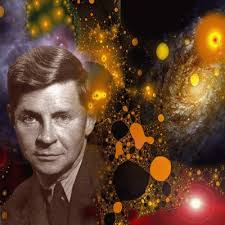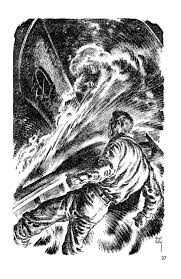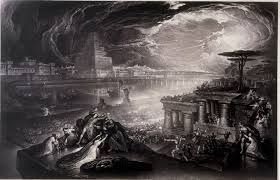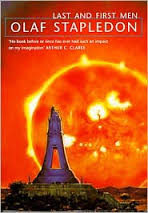olaf stapledon
and the old solar system
[ + link to: Solar System of Ideas ]

Into his history of Man over the next two billion years, Last and First Men, Stapledon weaves the story of four worlds - five if you count the Moon in its role as destroyer of Earth.
A couple of his lesser works, The Flames and Last Men in London, also contribute to the OSS.
world by world
From the Sun: The Flames.
On Venus: Last and First Men Parts XII - XIII. Six hundred years of Man's history after his abandonment of Earth.
On Earth: Last and First Men, Parts I - VII and IX - XII. Four hundred million years of Man's history, stretching from our own species (the First Men) to the last Terrestrials (the Fifth Men).
(And as a minor accompaniment to this mind-boggling saga, one of the chapters of Last Men in London tells of a prehistoric, pre-human intelligent race on Earth, in the chapter "The Philosophical Lemurs".)
There is a very brief tie-in reference in his "contemporary superman" novel Odd John (1935), where it states that John, despite his advanced nature, is still far inferior in development to the Second Men who will evolve in ten million years' time (and whose career is described in Last And First Men).
Concerning the Moon: Last and First Men, Part XII chapter 3. Our satellite eventually spirals inward to cause the destruction of Earth, by increasing tidal disruption and a final collision four hundred million years from now.
(Cause of the disaster - some kind of mind-over-matter disturbance in gravity, whereby Earth's pull is unwittingly increased by the culture of the Fifth Men. Doubtless explicable by the principles of "psycho-physics" alluded to in chapter 4 of Part XI.)
Concerning Mars: Last and First Men, Parts VIII and IX. Stapledon brilliantly digresses from humanity in order to describe the Martians and their civilization, before narrating their invasion of Earth.
On Neptune: Last and First Men, Parts XIV - XVI. Driven from Venus by another cosmic disaster a thousand million years in our future - an interstellar gas cloud collides with the sun and causes it to flare and expand, destroying the inner solar system - Man makes Neptune his final home.
Here his civilization falls and rises again to new heights, only to face destruction at last because of a change in solar radiation, triggered by output from a neighbouring star.
Also, the beginning and the end of Last Men in London give us some scenes on Neptune.
So there you have it. A trio of cosmic calamities drives Man from planet to planet until he meets his end on Neptune. Quite an experience.
Harlei: You make one of my favourite books sound rather grim.
Zendexor: Or inspiring - depends how you view the matter. Man survives cataclysm after cataclysm. Sure, his luck runs out eventually. But, heck, nothing lasts forever, and, by the end of the account (two thousand million years hence, which I bet is a lot longer than most of us believe our species will last), you could say we've had a good innings.
Admittedly the going can get rocky at times, as when some of our descendants allow their culture to develop an over-stratified class structure:

A petty dispute had occurred in one of the new mines. The management refused to allow miners to teach their trade to their sons; for vocational education, it was said, should be carried on professionally. Indignation against this interference with parental authority caused a sudden flash of the old rage. A power unit was seized, and after a bout of insane monkeying with the machinery, the mischief-makers inadvertently got things into such a state that at last the awful djinn of physical energy was able to wrench off his fetters and rage over the planet. The first explosion was enough to blow up the mountain range above the mine. In those mountains were huge tracts of the critical element, and these were detonated by rays from the initial explosion. This sufficed to set in action still more remote tracts of the element...
Interesting to read this in a book published in 1930, an era before atomic energy had become fact, before "chain reaction" became part of our familiar vocabulary...
...a few remote settlements escaped the actual track of the eruptions, but succumbed in a few weeks to hurricanes of steam. Of the two hundred million members of the human race, all were burnt or roasted or suffocated within three months - all but thirty-five, who happened to be in the neighbourhood of the North Pole.
Stid: You win some, you lose some. It's a book for big minds.
Zendexor: Winston Churchill was impressed by it and wrote of it in one of his essays. J B Priestley and Arnold Bennett admired it. Why it's not more famous than it is, I don't know.
Harlei: Please quote something pleasant, to correct the impression that Last and First Men is one long catalogue of disasters.
Zendexor: Very well, here's one paragraph from the account of our time on Venus:
Of all human species these bat-like Flying Men, the Seventh Men, were probably the most carefree. Gifted with harmonious physique and gay temperament, they came into a social heritage well adapted to their nature. There was no occasion for them, as there had often been for some others, to regard the world as fundamentally hostile to life, or themselves as essentially deformed. Of quick intelligence in respect of daily personal affairs and social organization, they were untroubled by the insatiable lust of understanding. Not that they were an unintellectual race, for they soon formulated a beautifully systematic account of experience. They clearly perceived, however, that the perfect sphere of their thought was but a bubble adrift in chaos. Yet it was an elegant bubble. And the system was true, in its own gay and frankly insincere manner, true as significant metaphor, not literally true. What more, it was asked, could be expected of human intellect? Adolescents were encouraged to study the ancient problems of philosophy, for no reason but to convince themselves of the futility of probing beyond the limits of the orthodox system. 'Prick the bubble of thought at any point', it was said, 'and you shatter the whole of it. And since thought is one of the necessities of human life, it must be preserved.'
Harlei: When I ask you to select something pleasant, you go and fetch something which is... all right, pleasant in a way, but also tinged with a definite melancholy. What about the triumphs of the Second and Fifth and Eighteenth Men?
Zendexor: It's hard to rip those grand effects out of their context into little quotable passages. The inquisitive reader of this site will just have to take our word for it, that Stapledon's epic moves one to cheer as well as weep.
Stid: What would you say to encourage a would-be reader who is put off by the emphasis on cultures rather than on individuals?
Zendexor: I'd answer that one by making three points.
First, you can't expect a narrative which covers two thousand million years to have much time for individuals.
Second, actually there nevertheless are some individuals who put in brief but powerful appearances - prophets, leaders, moulders of opinion such as the Divine Boy of the Patagonians, the musical prophet of the Third Men, the American who founds the First World State, the expectant mother who gives the survivors of the nuclear disaster their will to persist, and the Last Man himself.
Third, the main point is that under the spell which Stapledon weaves, species and culture become characters which the reader can identify with as though they were individuals. Talk of "sitting in a café and watching the world go by" - this is it, the greatest, most colourful, most vivid procession of fates, fortunes, events and ideas that you could ever imagine, parading past you along the pavement of Time. Believe me, one doesn't want to grumble about the view!
Before you begin to read it, you may doubt whether it is possible to achieve this effect. But your doubt won't last.
Stid: You don't have any negative criticism to make, then?

Zendexor: I wouldn't alter anything that's written in the book. Not even the out-of-date Parts I and II, the result of speculation about the immediate future, naturally superseded by events since 1930 - a section of the book which I would retain as a curiosity. And the most incredible peculiarity in the story - that it took Man hundreds of millions of years to get around to achieving space travel, and even the Fifth Men only achieved it because they had to - even that, I just accept, because I'm so enthralled, I accept just about anything.
I might, however, have wished for more information at some points -
Harlei: Yeah, it's a bit frustrating, the way he keeps saying "We must not dwell upon" this or that:
It is not possible to recount the stages by which the Fifth Men advanced towards their greatest civilization and culture... [p225]
To give an account of this period, even on the minute scale that has been adopted hitherto, would entail another volume... [p255]
We need not dwell upon these multitudinous reiterations of culture... [p259]
Of the hundred million years which passed before the Sixteenth Men produced the new human type, I must not pause to tell... [p283]
I must not stay to describe in detail this society of ours, in which a million million citizens, grouped in over a thousand nations, live in perfect accord without the aid of armies or even a police force. I must not tell of our prized social organization... [p303]
Zendexor: Fortunately he does manage to say a heck of a lot in the book's 300-or-so pages. Sometimes he says it even while saying he can't say it, as in the coda to the epic drama of the Third-Fourth-Fifth men:
How from this pair of individuals the new population gradually arose; how at first it was earnestly fostered by its creators; how it subsequently asserted its independence and took control of its own destiny; how the Great Brains failed piteously to understand and sympathize with the mentality of their creatures, and tried to tyrannize over them; how for a while the planet was divided into two mutually intolerant communities, and was at last drenched with man's blood, until the human automata were exterminated, the Great Brains starved or blown to pieces, and the Fifth Men themselves decimated; how, as a result of these events, a dense fog of barbarism settled once more upon the planet, so that the Fifth Men, like so many other races , had after all to start rebuilding civilization and culture from its very foundations; how all these things befell we must not in detail observe.
Nevertheless I wouldn't mind asking other readers' opinions on one issue in particular - the topic of adaptation to new worlds.
Man twice has to get used to a new planet. First, when the Moon's fall forces him to relocate from Earth to Venus:
Man looked upon his future home with loathing...
The first human settlers on Venus knew well that life would be a sorry business. They had done their best to alter the planet to suit human nature, but they could not make Venus into another Earth. The land surface was minute. The climate was almost unendurable. The extreme difference in temperature between the protracted day and night produced incredible storms, rain like a thousand contiguous waterfalls, terrifying electrical disturbances, and fogs in which a man could not see his own feet. To make matters worse, the oxygen supply was as yet barely enough to render the air breathable...
Now, the oxygen problem is eventually solved by increasing vegetation. But what of the other disadvantages of Venus?
Fast forward to the Seventh Men, and Venus seems quite a nice place. What has changed? Is it just human adaptation? (Plus the extermination of the hostile underwater Venerians!) Human adaptation did occur, but somehow doesn't explain enough. I suspect that conditions on the planet must have become significantly more favourable with geologic time, but the author doesn't say so. To me, that's a surprising omission.
The same problem, perhaps even more pronounced, arises when the Sun's expansion forces Man to migrate to Neptune. Neptune is horrid at first, but becomes fine a few hundred million years later on.
In particular, the planet's atmosphere improves out of all recognition.
At the time of the emergency migration:
...the atmospheric pressure on Neptune was unendurable. For the great planet bore a gaseous envelope thousands of miles deep. The solid globe was scarcely more than the yolk of a huge egg. The mass of the air itself combined with the mass of the solid to produce a gravitational pressure greater than that upon the Venerian ocean floor. The Eighth Men, therefore, dared not emerge from their ether-ships to tread the surface of the planet save for brief spells in steel diving suits...
A billion years later, however, the Last Men are able to have pleasant open-air star-gazing picnics on the shoreline of Neptunian seas.
I find it surprising that such an important change is more implied than stated.
Of course, a lot can happen in a billion years, and the first steps were hard enough:

It was in desperate haste that the last Venerian men had designed and fashioned the new species for the colonization of Neptune. The mere remoteness of the great planet, moreover, had prevented its nature from being explored at all thoroughly, and so the new human organism was but partially adapted to its destined environment. Inevitably it was a dwarf type, limited in size by the necessity of resisting an excessive gravitation. Its brain was so cramped that everything but the bare essentials of humanity had to be omitted from it. Even so, the Ninth Men were too delicately organized to withstand the ferocity of natural forces on Neptune...
For it so happened that the still youthful giant, Neptune, was slowly entering one of his phases of crustal shrinkage, and therefore of earthquake and eruption. Thus the frail colonists found themselves increasingly in danger of being swallowed in sudden fiery crevasses or buried under volcanic dust. Moreover, their squat buildings, when no actually being trampled by lava streams, or warped and cracked by their shifting foundations, were liable to be demolished by the battering-ram thrust of a turbulent and massive atmosphere. Further, the atmosphere's unwholesome composition killed all possibility of cheerfulness and courage...
Three hundred million years later, we hear, the animal descendants of the Ninth Men evolve back to humanity. First there's a "hairless, rabbit-like creature, scampering on the polar grasslands" which took to the shrublands and changed its manner of life, "throve, adopted an almost upright gait, continued to increase in stature and in brain... The new regions of the brain were no mere revival of the atrophied human cerebrum, but a new organ, which overlaid and swallowed up that ancient relic. The creature's mind, therefore, was in many respects a new mind, though moulded to the same great basic needs. Like his fore-runners, of course, he craved food, love, glory, companionship. In pursuit of these ends he devised weapons and traps, and built wicker villages. He held pow-wows. He became the Tenth Men."
Well - you see the environment has a different feel now. But what has happened to alter the world? Again I feel I must make the point, that we are just not told.
Harlei: Are we really left totally in the dark? I don't think so - I can find two clues. One is that - as you quoted earlier - Neptune was previously in a crustal-shrinkage phase. That must have ended. That, therefore, is one big change, surely.
Secondly, on page 279-80 we have a very interesting paragraph. (It immediately follows the passage you just quoted.)
For a million terrestrial years these long-armed hairless beings were spreading their wicker huts and bone implements over the great northern continents, and for many more millions they remained in possession without making further cultural progress; for evolution, both biological and cultural, was indeed slow on Neptune. [This slowness is ascribed to the length of the Neptunian year.] At last the Tenth Men were attacked by a micro-organism and demolished. From their ruins several primitive human species developed, and remained isolated in remote territories for millions of decades, until at length chance or enterprise brought them into contact. One of these early species, crouched and tusked, was persistently trapped for its ivory by an abler type, till it was exterminated. Another, long of muzzle and large of base, habitually squatted on its haunches like the kangaroo. Shortly after this industrious and social species had discovered the use of the wheel, a more primitive but more war-like type crashed into it like a tidal wave and overwhelmed it. Erect, but literally almost as broad as they were tall, these chunkish and bloody-minded savages spread over the whole arctic and sub-arctic region and spent some millions of years in monotonous reiteration of progress and decline; until at last a slow decay of their germ-plasm almost ended man's career. But after an aeon of darkness, there appeared another thick-set, but larger brained, species. This, for the first time on Neptune, conceived the religion of love, and all those spiritual cravings and agonies which had flickered in man so often and so vainly upon Earth and Venus. There appeared again feudal empires, militant nations, economic class wars, and, not once but often, a world-state covering the whole northern hemisphere. These men it was that first crossed the equator in artificially cooled electric ships, and explored the huge south. No life of any kind was discovered in the southern hemisphere; for even in that age no living matter could have crossed the roasting tropics without artificial refrigeration. Indeed, it was only because the sun's temporary revival had already passed its zenith that even man, with all his ingenuity, could endure a long tropical voyage.
Spot the clue, in that last sentence! The Sun is cooling after the flare-up which had occasioned the migration from Venus.
Zendexor: And that point can be stretched perhaps, to justify Neptune's gradual shift to pleasant habitability.
Meanwhile, you did well to quote the whole paragraph, as it gives the flavour of Stapledon's narrative, especially in this last phase as he zooms across ever more immense tracts of time. (For more on the world of the Last Men, see our Neptune page.)
The discussion and the quotations on this page do not really do justice to the spiritual force of Stapledon's vision, but I hope that any sf reader who has not yet read him may be drawn by curiosity to experience the great work.
Note that by "spiritual" I do not always mean "good". There is spiritual good, spiritual evil, spiritual ambiguity... a subtle reality playing across all three. I finish the page with Stapledon's account of man's final solution of the native problem on Venus.
It was hoped, of course, that in colonizing Venus mankind would be able to accommodate itself without seriously interfering with the native population. But this proved impossible for two reasons. In the first place, the natives seemed determined to destroy the invader even if they should destroy themselves in the process. Titanic explosions were engineered, which caused the invaders serious damage, but also strewed the ocean with thousands of dead Venerians. Secondly, it was found that, as electrolysis poured more and more free oxygen into the atmosphere, the ocean absorbed some of the potent element back into itself by solution; and this dissolved oxygen had a disastrous effect upon the oceanic organisms. Their tissues began to oxidise. They were burnt up, internally and externally, by a slow fire. Man dared not stop the process of electrolysis until the atmosphere had become as rich in oxygen as his native air. Long before this state was reached, it was already clear that the Venerians were beginning to feel the effects of the poison, and that in a few thousand years, at most, they would be exterminated. It was therefore determined to put them out of their misery as quickly as possible. Men could by now walk abroad on the islands of Venus, and indeed the first settlements were already being founded. They were thus able to build a fleet of powerful submarine vessels to scour the ocean and destroy the whole native fauna.
This vast slaughter influenced the mind of the fifth human species in two opposite directions, now flinging it into despair, now rousing it to grave elation. For on the one hand the horror of the slaughter produced a haunting guiltiness in all men's minds, an unreasoning disgust with humanity for having been driven to murder in order to save itself. And this guiltiness combined with the purely intellectual loss of self-confidence which had been produced by the failure of science to account for the moon's approach. It reawakened, also, that other quite irrational sense of guilt which had been bred of sympathy with the everlasting distress of the past. Together, these three influences tended towards racial neurosis.
On the other hand a very different mood sometimes sprang from the same three sources. After all, the failure of science was a challenge to be gladly accepted; it opened up a wealth of possibilities hitherto unimagined. Even the unalterable distress of the past constituted a challenge; for in some strange manner the present and future, it was said, must transfigure the past. As for the murder of Venerian life, it was, indeed, terrible, but right. It had been committed without hate; indeed, rather in love. For as the navy proceeded with its relentless work, it had gathered much insight into the life of the natives, and had learned to admire, even in a sense to love, while it killed. This mood, of inexorable yet not ruthless will, intensified the spiritual sensibility of the species, refined, so to speak, its spiritual hearing, and revealed to it tones and themes in the universal music which were hitherto obscure.
Last and First Men (1930); Last Men in London (1932); The Flames (1947)
For Stapledon's contemplative fatalism, see the page on Religion in the Old Solar System.
For the Fourth Men - the Great Brains - see the page on hyper-brains.
For The Flames see the OSS Diary, 31st January 2017.
For contrasting time-scales in Wells and Stapledon, see the OSS Diary, 20th February 2017.
For the planetary group-mind of the Last Men see Living Worlds.
Extracts: Men re-evolve on far-future Neptune - Artificial mountain on Neptune.
>> Authors











































